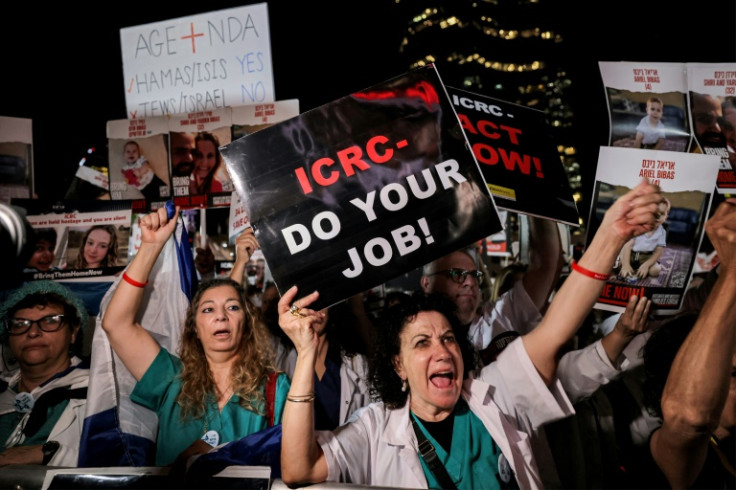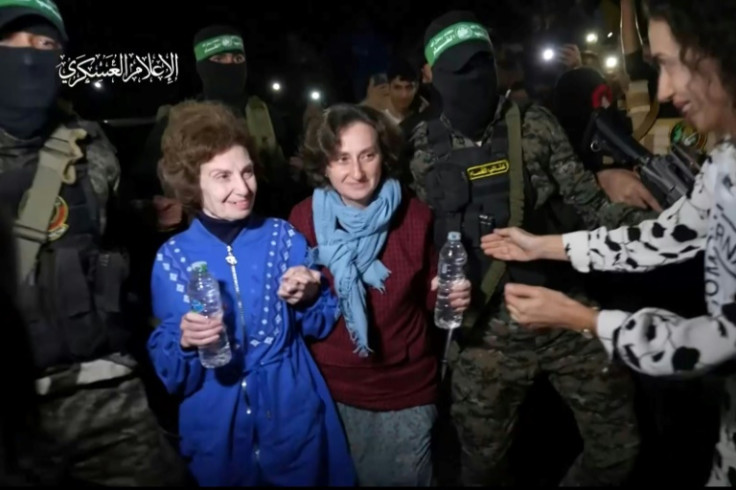
The Red Cross, which has faced criticism for not doing enough for hostages and prisoners in the Gaza conflict, stresses it has no "superpowers" and relies on the warring parties for access.
The International Committee of the Red Cross, founded 160 years ago to serve as a neutral intermediary between belligerents in conflict and to visit and assist prisoners of war, has been accused by both sides in the Israel-Hamas conflict of not providing adequate help to those being held.
"From time to time, we have to tell people we're not bulletproof," ICRC spokesman Jason Straziuso told AFP.
"We don't have superpowers. We can only take humanitarian action when the authorities in a given area give us the permission."
In recent days, amid a temporary truce in fighting in Gaza, the Geneva-based organisation's vehicles have brought dozens of hostages out of the Palestinian enclave.
In their unprecedented October 7 attacks, Hamas militants broke through Gaza's militarised border into Israel, killing 1,200 people, mostly civilians, and kidnapping about 240, according to Israeli authorities.
In response, Israel vowed to eliminate Hamas and unleashed a relentless air and ground military campaign that the Hamas government says has killed nearly 15,000 people in Gaza, also mostly civilians.
Since the truce began on November 24, 70 Israeli hostages have been freed in return for 210 Palestinian prisoners.
But instead of being hailed for its role in bringing out many of the freed hostages, the ICRC has been slammed on social media as a "glorified taxi service" or "Uber".
It has been criticised for not taking part in negotiations that led to their liberation, and for not visiting those remaining in captivity in Gaza.
It has also faced criticism for not pressuring Israel to liberate more Palestinian prisoners, and for not bringing more aid into Gaza.
Straziuso said much of the criticism showed "a lack of understanding of how we work or the limitations of our work".
"We are not an intelligence agency," he said stressing that to locate and access the hostages held in Gaza, for instance, the organisation needed Hamas authorisation and safety guarantees.
"We couldn't possibly just simply start walking through Gaza and trying to locate hostages," he said.
Such an action, he said, "could directly put the hostages in danger and it could put our team in danger".
Julie Billaud, an associate professor at Geneva's Graduate Institute of International and Development Studies, agreed.
"The humanitarian organisations in general and ICRC in particular cannot substitute the political work needed to, first, end this war and, second, the apartheid regime that kindled it," she told AFP.
Marco Sassoli, an international law professor at Geneva University who used to work for the ICRC, meanwhile explained why the organisation could not take part in negotiating the hostages' release.
If international humanitarian law was being respected, "hostages, unlike prisoners, must be freed unconditionally and without negotiation", he told AFP.
Thus, "the ICRC can offer its services as a neutral intermediary, but it will not negotiate the hostages' liberation".
Gaza is not the only place where the ICRC has faced criticism.
Ever since Russia's full-scale invasion of Ukraine in February 2022, Ukrainian President Volodymyr Zelensky has repeatedly and publicly questioned its lacking access to prisoners of war held by Moscow and its allies.
The organisation, which relies on discretion and discussions with all sides in a conflict to ensure its neutrality and the access it needs to carry out its work, has also been criticised for not detailing how many PoWs it has been able to visit and for its continued high-level contact with Moscow.
Sassoli lamented that there today was "less and less understanding of neutrality", with everyone, including the ICRC, pressured to "take a position and say there are bad guys and good guys".
"If the ICRC only negotiates with good guys, they will have barely anyone to negotiate with in armed conflicts," the professor warned.








